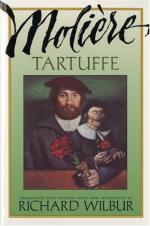|
This section contains 5,946 words (approx. 20 pages at 300 words per page) |

|
SOURCE: “Molière's Tower of Babel: Monsieur de Pourceaugnac and the Confusion of Tongues,” in Nottingham French Studies, Vol. 33, No. 1, Spring, 1994, pp. 59-70.
In the following essay, Kenny explores Molière's struggles in creating the new genre of musical-comedy.
Much modern criticism has positively re-evaluated Molière's comédies-ballets in the context of the argument for a ‘third manner’ Molière who turns away from high comedy of language towards an irrational world of fantasy and illusion. Gérard Defaux and Claude Abraham make this case eloquently in spite of the somewhat embarrassing presence of Les Femmes savantes, while more recently Patrick Dandrey has disagreed radically with this thesis, particularly with reference to the musical coherence of the comédie-ballet.1 The tripartite division of Molière's thought and work, though it contains many useful insights, is largely the result of neat academic hindsight and the deification of Moli...
|
This section contains 5,946 words (approx. 20 pages at 300 words per page) |

|


